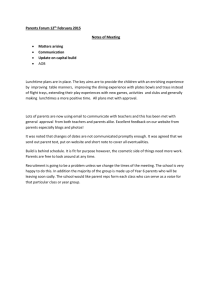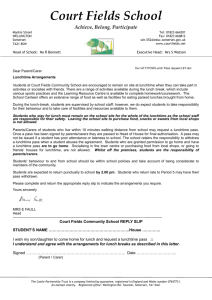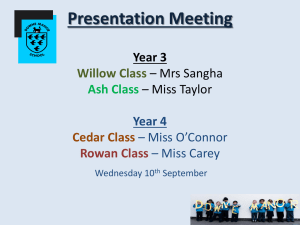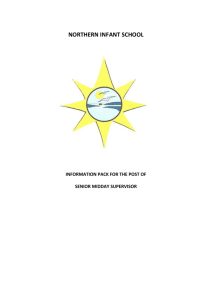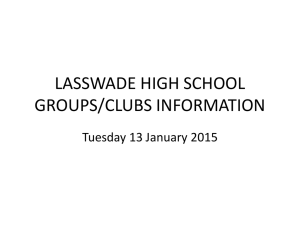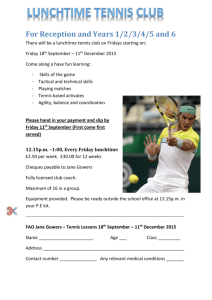Bluebell Primary School Lunchtime Policy & Procedures
advertisement
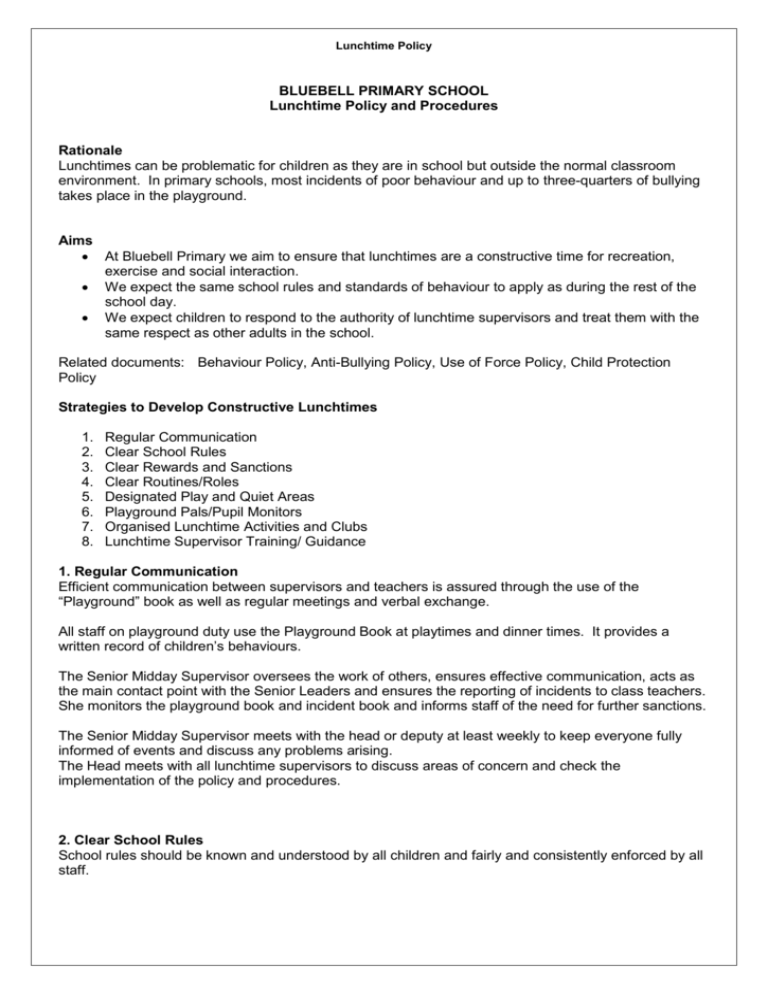
Lunchtime Policy BLUEBELL PRIMARY SCHOOL Lunchtime Policy and Procedures Rationale Lunchtimes can be problematic for children as they are in school but outside the normal classroom environment. In primary schools, most incidents of poor behaviour and up to three-quarters of bullying takes place in the playground. Aims At Bluebell Primary we aim to ensure that lunchtimes are a constructive time for recreation, exercise and social interaction. We expect the same school rules and standards of behaviour to apply as during the rest of the school day. We expect children to respond to the authority of lunchtime supervisors and treat them with the same respect as other adults in the school. Related documents: Behaviour Policy, Anti-Bullying Policy, Use of Force Policy, Child Protection Policy Strategies to Develop Constructive Lunchtimes 1. 2. 3. 4. 5. 6. 7. 8. Regular Communication Clear School Rules Clear Rewards and Sanctions Clear Routines/Roles Designated Play and Quiet Areas Playground Pals/Pupil Monitors Organised Lunchtime Activities and Clubs Lunchtime Supervisor Training/ Guidance 1. Regular Communication Efficient communication between supervisors and teachers is assured through the use of the “Playground” book as well as regular meetings and verbal exchange. All staff on playground duty use the Playground Book at playtimes and dinner times. It provides a written record of children’s behaviours. The Senior Midday Supervisor oversees the work of others, ensures effective communication, acts as the main contact point with the Senior Leaders and ensures the reporting of incidents to class teachers. She monitors the playground book and incident book and informs staff of the need for further sanctions. The Senior Midday Supervisor meets with the head or deputy at least weekly to keep everyone fully informed of events and discuss any problems arising. The Head meets with all lunchtime supervisors to discuss areas of concern and check the implementation of the policy and procedures. 2. Clear School Rules School rules should be known and understood by all children and fairly and consistently enforced by all staff. Lunchtime Policy No children are permitted to remain in the school building during playtimes and lunch breaks without adult supervision. In the case of lunchtime clubs, the children must follow the procedures for that club. The only exception to this rule is monitors with a specific task not requiring supervision i.e. register monitors. Areas out of Bounds All grassed areas in unsuitable weather Toilets (unless for proper use) Outdoor Learning Area and path by bicycle shed. In suitable weather conditions the field may be used at lunchtimes. This is the decision of staff on duty. Activities Not Permitted “Play” or “Fun” fighting/ wrestling “Bull dog” or other games used as an excuse for overly physical contact Football with more than 10 players in total per game More than 3 games of football at any one time Bringing own play equipment from home Our Code of Conduct We show good manners We take care of everyone and everything We follow instructions When the Bell goes We stop what we are doing and put equipment down We stand still We are quiet We follow the instructions Our Listening Code When an adult asks for my attention I: Stop what I am doing Empty hands Look at the adult Keep quiet and still Listen 3. Rewards and Sanctions All staff should be fully aware of playtime procedures, rules, sanctions and rewards (see Behaviour Policy) and apply them consistently. The “Playground Book” needs to be taken out every playtime to record the application of these procedures and track the behaviour of individuals. Supervisors’ authority is acknowledged, by them operating rewards and sanctions, with the full support of teaching staff. Lunchtime Policy Rewards Each class has a reward chart. They have Silver and Gold cards. The cards are awarded to the class daily by the lunchtime staff. If they have earned a silver card, they gain 1 sticker, if they earn a gold card, they earn 2 stickers. Once the reward chart is complete, the class may choose a reward to have in the classroom. Sanctions Sanctions must be fairly and consistently applied and be seen to match the offence in order to be most effective. Responses range from polite reminders to permanent exclusion. Misdemeanours If a minor infringement occurs: Step 1 Give a polite but firm request to stop. Step 2 Give a final warning. Use the agreed phrase, “This is your final warning, do you understand?” FROM NOW ON GIVE NO MORE WARNINGS: APPLY SANCTIONS Step3 Isolate the child in the “calm down area” in order to reflect and calm down. No longer than 5 minutes and visual supervision must be maintained. Record child’s name and reason for sitting out in the Playground Book. Step 4 Treat as “Unacceptable Behaviour” For regular misdemeanours, teachers will be informed and the child will receive additional sanctions such as loss of playtimes. For persistent misdemeanours parents will be informed and the child will receive further addition sanctions such as loss of playtimes, golden time etc. If there is no improvement the child will be set clear targets for lunchtime behaviour in order to avoid exclusion. Parents to attend the meetings with a Senior Leader and agree the targets. Any child continuing to present problems could be temporarily or permanently excluded from lunchtimes. The senior midday supervisor in charge is responsible for monitoring the Playground Book daily and informing staff of the need for further sanctions. Unacceptable Behaviour Unacceptable behaviour would include: Fighting Bullying (physical and verbal) Racial abuse Damage to school property Theft Verbal/physical assault on adults Lunchtime Policy All incidents of this type must be dealt with in a more formal way. If behaviour results in physical or verbal abuse the appropriate forms need to be completed. If physical intervention of any kind is required it should be consistent with our “Use of Force Policy” and the appropriate forms should be completed the same working day. Other incidents deemed unacceptable behaviour should be recorded on the appropriate forms. Incidents should be recorded verbatim using the actual words/actions heard or seen along with the name of the victim and signed by the person making the report. Sanctions available: Referral to Senior Leaders Removal from playground Class teacher informed Parents informed Loss of lunchtime/ lunchtime exclusion School exclusion If the problem persists it may be necessary to involve outside agencies such as behaviour support or educational psychologist. Serious incidents involving violence, abuse or vandalism need to be responded to on an individual basis with appropriate sanctions including immediate permanent exclusion if necessary. 4. Routines/ Roles There are 9 lunchtime supervisors 1st sitting 12:00 am The class teacher or teaching assistant will bring Reception, Willow, Year One and Year Two to the dining hall, where the children will be expected to sit down quietly ready to eat. Tracey Jones will be with the reception class for at least the first term. The other lunchtime supervisors will be split into 2 groups. One group will be in the hall when children enter, ready to receive them and monitor that they sit down quietly. Once all children are seated a supervisor will start off the lunchtime. All MSA’s in the hall work together to supervise the children, check dinner numbers, cutting food, distributing drinks etc. Once children have finished eating, they can go outside. If lots of children have finished prior to 12.30, then another assistant needs to go outside. 2nd Sitting At 12.30 the bell is rung. All children are expected to stop, put down anything they have and stand still and quietly. When all children are quiet, the bell is rung again and the children in years 3-6 walk quietly in to the hall. When the bell is rung, one MSA who has been outside, needs to position themselves by the entrance, another at the hall door, and one to follow the children in. At this point, all other MSA’s go outside. Lunchtime Policy MSA’s supervise the children entering the hall, getting their lunch and sitting down quietly and sensibly to eat it. All MSA’s in the hall work together to supervise the children, check dinner numbers, cutting food, distributing drinks etc. Once the children have finished eating, the children are sent outside, MSA’s go back outside as the hall clears of children, leaving just one MSA remaining until all children have gone. 12:58 The internal buzzer will go to warn staff they need to get back to their classrooms. One MSA to go and check all the external doors are open for the children to get in. Reception MSA goes to the main door, ready to receive the Reception children. The bell is rung and all children expected to stop, put things down and stand still. When all is quiet, the bell is rung again and the children walk quietly to their classrooms, going straight in through the external doors. Each MSA goes towards a class to monitor the children in the classroom. Dinner Hall Procedures There are two dinner sittings organised to reduce congestion and therefore potential problems in the hall . Sitting 1: R, Y1, Y2 and Willow (dinners and packed lunches). Sitting 2: Y3, Y4,Y5 and Y6 (dinners and packed lunches). Each child takes a seat on entering the hall in sitting 1. Sitting 2, children need to get their lunch prior to taking a seat. Observe the queue to ensure that there are not too many children queuing at any one time. Lunchtime supervisors continuously circulate assisting children and watching behaviour, remembering to praise good behaviour, good sitting and quiet voices. Children raise hands to gain attention; shouting out should be ignored. Indoor Lunchtimes In poor weather, duty staff may decide that children should not go outside at lunchtime. In such cases all classes should be purposefully occupied with table-top activities and games. 3 MSA’s to supervise R, Y1 and Y2. 1 MSA supervises Y3 and Y4. 1 MSA supervises Y5 and Y6. Willow MSA’s to supervise Willow class. Other MSA’s support where needed to ensure smooth transition to and from hall. 5. Designated Play Areas The school’s playground environment is carefully organized to offer space for educational, social, physical and creative activities, reduce boredom and therefore bad behaviour. Multi Sports Court Netball and basketball Car Park End of Multi sports area Skipping Entrance through car park gate Games area Pergoda and soft surface area Lunchtime Policy Quiet area – games such as dominoes, chess, Jenga Field Football/Volleyball (Winter) Maximum of 2 games of football – no more than 10 players per game. Bibs/bands are available for children for ease of identification. Athletics/Rounders/Cricket (Summer) By tyres Football area for Reception children with mini goals 6. Peer Mediator Peer Mediators across Key Stage 2 agree to help mediate any issues and difficulties around friendship during lunchtimes. 7. Lunchtime Supervisor Training/ Guidance General Advice Follow the training in de-escalation that you received from Norfolk Steps DO NOT SHOUT The staff don’t and children will only shout louder! Shouting is a sign that you have lost control. Use a quiet voice when talking to individuals. BE POSITIVE Try to see good things being done in the hall, corridors and playground i.e. helping others, walking sensibly, playing co-operatively etc. Praise them and offer rewards. Try to make at least 5 positive comments for every negative. Choose to reward those behaving well rather than focussing on those who are not. Avoid confrontation, but do not ignore bad behaviour. It is important always to label the behaviour and not the child (e.g. “It’s dangerous to run in the corridor someone could get hurt” and not “You stupid boy you will hurt someone”. PLAY with the children! Try to engage target children in constructive play. Prevention is always better than cure! When on duty, staff should circulate and take the opportunity to socialise with children, whilst maintaining an overview of the play area and spotting potential problems before they escalate. One member of staff per zoned area maximises levels of visual supervision. Use agreed phrases/codes “Can I have your attention please” when addressing a group. “This is your final warning, do you understand?” before resorting to sanctions. Use reminders of rules Refer to school’s rules when discussing appropriate behaviour i.e. “If you climb on the wall you’re not taking care of yourself, you might fall.” “ This is not safe behavior and we need to make sure that you are safe.” CHILDREN TEND TO SHOW RESECT WHEN THEY ARE SHOWN RESPECT No child should ever be “sent to the Head” as a sanction, as there is no guarantee that the child will arrive or that the Head will be available. If, in exceptional circumstances, a child needs to be removed Lunchtime Policy from the playground or refuses to follow instructions, the senior midday supervisor should be sent for. If the child is at risk of causing significant harm to themselves, others or school property, then send for the Headteacher, Special Needs Co-ordinator or Deputy Headteacher. Our “Use of Force Policy” clearly defines what is and is not acceptable practice should physical intervention ever be required. It is vital that any such intervention be reported and recorded. If a child should run out of school for whatever reason, staff should not overreact and must never run after them. The Headteacher or other senior leader should be informed immediately. In most cases the child will quickly return, remain on site or stay within visual contact. Once the child has calmed down, the Head or senior leader, will attempt to approach the child and calmly persuade him/her to return to return to school and discuss the situation. If the child refuses or leaves the site, parents should be informed immediately and asked if they would like the police informing. If parents and emergency contacts are unavailable the police should be informed directly. If any Lunchtime Supervisor is subjected to verbal or physical assault, the Head or Deputy should be informed immediately. The midday supervisor should complete the appropriate incident form and pass it to the Headteacher before the end of the day. Accident and Injury First aid boxes are stored just inside the external doors, as well as the medical room for the treatment of minor injuries. The names of trained first-aiders are displayed next to first aid boxes and are available if thought to be necessary. Major injuries should be reported to the Head or Deputy as soon as possible. All injuries need to be entered in the “Accident Book”. Children are given a note to inform parents of any injury and treatment received, especially if the accident involved a bump to the head. The Role of the Class teacher With the exception of the Head and Deputy, teachers are not required to perform lunchtime supervision duty. This does not however, absolve teachers in law from attending to a situation involving a pupil, if the matter is brought to their attention. At all times, whilst on the premises, the welfare and safety of pupils is paramount. Teachers can help improve lunchtime behaviour; By helping children learn to play in more imaginative and constructive ways by teaching playground games/songs and using playground equipment during PE lessons. By supporting lunchtime supervisors and treating them as full staff members, thus raising their status and authority in the eyes of children. Keeping lunchtime supervisors informed of any children with problems or who are experiencing particular difficulties. Checking the Playtime Book and Incident Book regularly and following up entries with the children concerned. Ensuring the Class of the Week has high status, that children strive to achieve it, and that successful classes are always rewarded. Using circle-time, drama and PSHE to explore themes such as bullying, self –esteem and resisting peer pressure. Written: September 2012 Last Updated: September 2012 Next Review: September 2013
